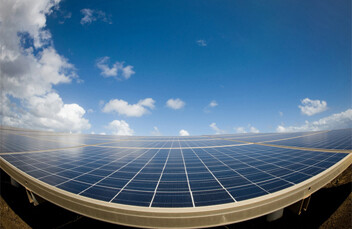Prospects for a renewable energy future are rapidly moving from aspiration to a realistic guide for action. The Gulf Oil disaster has heightened a global sense of urgency and helped accelerate the determination to move from fossil fuel business-and-pollution-as-usual, to reliance upon efficiency and renewables to heat and cool our homes and businesses, to power our factories and our automobiles.
Gregor Czisch of Transnational Renewables Consulting (Kassel, Germany) and I have drafted, with input from other signers, a Declaration of Support for an Efficient Renewable Energy Future, published for the first time by the Carnegie Council's Policy Innovations. The Declaration is more than an assertion that by 2030 we can reduce fossil fuels use by a minimum of 80 percent. The Declaration is a call to quickly complete comprehensive analysis and modeling for the construction and operation of renewable power grids across the industrial world as we proceed with renewable and efficiency development.
A renewable energy and efficiency consensus is rapidly emerging. This is the context of the Declaration: on July 7, 2010, Germany's Federal Environment Agency announced that Germany could derive all its electricity from renewables by 2050 and be the first major industrial nation to end its addiction to fossil fuels. Complete reliance on renewables is possible both technically and ecologically. According to Jochen Flasbarth, president of the Federal Environment Agency, "It's a very realistic target based on technology that already exists—it's not a pie-in-the-sky prediction." Germany's Renewable Energy Act has led to the creation of tens of thousands of new jobs and the sector is projected [PDF] to employ some 400,000 people by 2020. Germany is already the world leader in photovoltaics with 14,000 MW expected to be installed by the end of 2010.
Germany is not alone. On June 18, Britain's Center for Alternative Technology (CAT) released a report [PDF] depicting a zero-carbon future for Britain by 2030. The report included input from thirteen universities, twelve research bodies, and eight key industry players. According to Andrew Simms, policy director of the new economics foundation, The BP fiasco underlines how important it is that we act now. If we do, we can enjoy greater energy security and a more sustainable, dynamic, and resilient economy. If we don't, we will lurch from one energy and environmental crisis to another on a downward spiral. Zero Carbon Britain 2030 shows us how to begin the Great Transition and reveals its huge potential.
The Declaration of Support for an Efficient Renewable Energy Future calls for moving quickly to understand how a renewable power system can be optimized technically, economically, and ecologically. The goal of building a sustainable renewable and energy efficient future is clear. What's needed is a detailed and fine-grained look at optimizing the balance between decentralized renewables and storage, for example, and the movement of energy resources over long distances when and if needed.
"We declare our commitment for a renewable energy and energy efficient future and offer our assistance in its optimization and development. We urge the installation and appropriate funding of adequate research facilities and research projects embracing all relevant aspects of the transformation," reads the Declaration. The call is not for years of study before action. Rather we must build the road as we travel. We need to begin building out the renewable and efficiency infrastructure on an accelerated basis while we consider as soon as possible its optimization.
The Declaration is about incentivizing and optimizing renewables and efficiency. It is not about taxing carbon. Our goal is to create millions of new jobs in sustainable industries building the renewable resource and efficiency future—sustainable industries that meet the triple bottom line test of economic, ecological, and social value. We need to have clear answers to a variety of questions, such as:
- How can renewable systems operate in conjunction with storage and smart control to reliably respond at all times to changes in system demand and renewable output?
- What's the optimal mixture of distributed generation near end users and system resources capable of being transmitted long distances?
- If we do need to move large amounts of power, do we need continental-scale grids covering long distances, or can augmented local transmission networks substantially do the job?
- If continental grids are called for, when is it advisable to link them?
- What policy, regulatory, and financial hurdles need to be cleared, and what are the preferred policy options such as feed-in-tariffs or high renewable portfolio standards and their costs and financing mechanisms?
- What security and safety issues need to be addressed, and how can they be resolved through renewable systems?
- What's the role of improving efficiency and reducing waste and taking advantage of thermodynamic efficiencies through heat pumps, cogeneration, and district heating?
- What's the possible role of natural gas as a transition fuel if renewable electrification and fuels are not yet fully available?
This Declaration is an expression of the work of scientists, energy policymakers, and energy developers who can bring to this matter their labs and analytic abilities to help plan and optimize a renewable energy and high-efficiency future. We offer technical assistance and guidance, but the issue is a matter of concern for all citizens facing the greatest challenge of the twenty-first century: transforming the self-destructive conduct of fossil fuel business as usual to a sustainable and prosperous renewable-resource and energy-efficiency future.
If not us, who? If not now, when? These are the questions we must ask ourselves as we look at our children and ponder their future. This is not just a matter for experts. We are talking about our prospects to pursue sustainable opportunities for ourselves, our children, and future generations. Now is the time to decide and to act.




